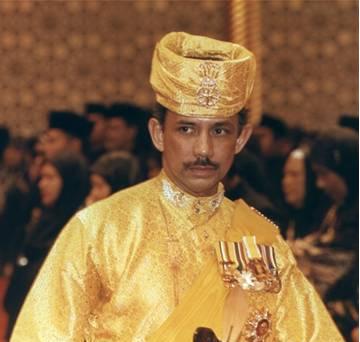

 | Dense Rain Forest Nearly half of Brunei is covered with dense, lush rain forests. They are filled with abundant animal life including lions, tigers, monkeys, and numerous reptiles and birds. "Tropical rain forests cover much of the interior, occupying nearly half of the country’s total area." |
Brunei is rich in wildlife, including monkeys and diverse birds and reptiles. Petroleum and natural gas are the primary mineral resources. Some species are threatened, but considerable revenue from oil sales has kept the pressure off of Brunei’s forests. Nearly 20 percent of the land area is now protected, and the country has ratified the Convention on International Trade in Endangered Species of Wild Fauna and Flora.
 |
POPULATION AND EDUCATION
Medical and educational services are relatively well developed and are largely financed by revenues from petroleum production. Education is compulsory for children aged 5 to 16 years and it is free at all levels. Primary and secondary education is provided in Malay, English, or Chinese. The University of Brunei Darussalam (1985) is located in Bandar Seri Begawan. There are also vocational schools and a teacher-training institution. In addition, the government pays the tuition of Brunei students who study at overseas universities.
GOVERNMENT
| Muda Hassanal Bolkiah, Sultan of Brunei Muda Hassanal Bolkiah became the sultan of Brunei in 1967. He has utilized the wealth generated by Brunei’s enormous oil and gas reserves to develop social and educational programs, which are provided free to all of the country’s citizens. |  |
Brunei is governed under a constitution promulgated in 1959, as amended. Under the constitution, executive authority is held by the Council of Ministers, which is presided over by the sultan of Brunei, and by the chief minister (mentri besar), who is responsible to the sultan. Since 1962, however, the sultan has ruled by decree. Brunei is a member of the United Nations (UN) and the Commonwealth of Nations.
ECONOMY
Brunei’s unit of currency is the Brunei dollar (1.69 Brunei dollars equal U.S.$1; 1999 average). The gross domestic product (GDP) of $15,390 per capita in 1998 was among the world’s highest, although much of this wealth is concentrated in relatively few hands. Muda Hassanal Bolkiah, the sultan of Brunei since 1967, is one of the world’s wealthiest persons. Brunei is a member of the Association of Southeast Asian Nations (ASEAN), a regional trade organization.
HISTORY
 | Sultan Omar Ali Saifuddin Mosque, Brunei The Sultan Omar Ali Saifuddin Mosque was named after the 28th sultan of Brunei. Designed by an Italian architect, the mosque was built in 1958 in the city of Bandar Seri Begawan. The golden-domed structure, the tallest building in the city, has Italian marble floors and walls. A stone replica of a 16th-century barge rests in the Brunei River in front of the mosque. Brunei is a sultanate on the northern coast of the island of Borneo in eastern Asia. |
In the early 16th century Brunei was a sultanate with nominal authority over the whole of Borneo and some parts of the Sulu Islands in the Philippines. It was first visited by Europeans in 1521, by the Spanish navigator Juan Sebastián del Cano. After this encounter, trade with Europeans, as well as piratical activities directed against them, developed quickly. The Spanish captured the capital in 1580 but were soon compelled to evacuate it. In 1645 a Spanish expedition failed to end Malay piracy in the region. Brunei was noted as a haven for pirates at the end of the 18th century. About 1849 the British, seeking to protect commerce between Singapore and northwest Borneo, started operations against the pirate fleets and destroyed them within five years. A few years earlier the sultan of Brunei, Omar Ali Saifuddin II, had granted Sarawak to the British army officer James Brooke as a reward for aid in quelling a civil war. Brooke assumed the title of raja and gradually extended his territory at the sultan’s expense (see Brooke, Sir James).
By 1846, when the island of Labuan was ceded to Britain, Brunei had been reduced almost to its present size. In 1888 it became a British protectorate. In 1906 the administration of the sultanate of Brunei was placed in the hands of a British resident, although the sultan remained in nominal authority. In 1959 the sultan, Omar Ali Saifuddin III, promulgated the first written constitution. Invited to join the Federation of Malaysia in 1963, Brunei was the only Malay state that elected to remain a British dependency. In January 1979, the British government signed a new treaty with the sultan, Muda Hassanal Bolkiah, and Brunei became an independent sovereign country on January 1, 1984.